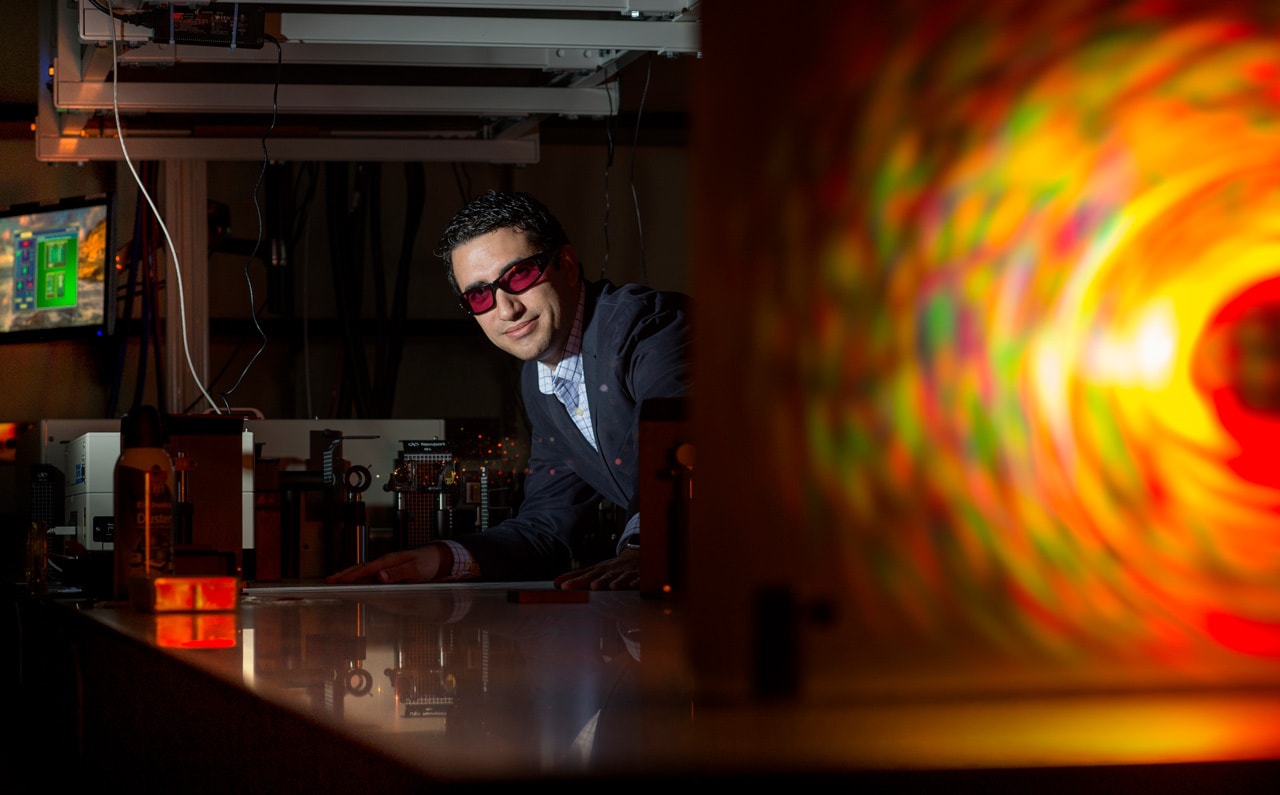
Laser-focused
Franklin Dollar, a pioneer in laser plasma research, is not only unraveling cosmic mysteries but also promoting equity and inclusivity in science education and research

Franklin Dollar, a pioneer in laser plasma research, is not only unraveling cosmic mysteries but also promoting equity and inclusivity in science education and research
The first experimenter at the new ZEUS laser facility helped build its predecessor, HERCULES. Franklin Dollar (MSE EE ’10, PhD Appl Phys ’12) studied under Karl Krushelnick, a professor of nuclear engineering and radiological sciences and now the director of the ZEUS facility.
There’s an animated joy to the way Dollar describes his field—like he can’t help smiling about the questions, the experiments that help answer them, the technologies that have spun out of the field and those that are coming in the future.
“It wasn’t that long ago that you could only get these answers from the middle of galactic nuclei or some crazy astrophysical process. Now we’re making these plasmas on lasers that fit in a university lab, and a PhD student in a basement can see these types of events unfold and tease out secrets of the cosmos,” Dollar said.
His work often pertains to controlling the interactions between the laser and target, which could lead to tabletop particle accelerators that change the way semiconductors are manufactured, help more hospitals produce their own radioactive medicines for targeting cancer, and enable a new kind of low-dose X-ray that can image soft tissues like organs.
Beyond plasma, Dollar is changing academia as the associate dean of graduate studies at the University of California, Irvine’s School of Physical Sciences. A member of the Dry Creek Band of Pomo Indians, he is likely only the third American Indian to be hired into a top-100 physics program as a tenured faculty member.
He has observed the many ways the United States leaves talent on the table, having spent his formative years on his tribe’s reservation. Growing up in Sonoma County, and getting electricity when typical American households were getting internet access, he experienced the stark contrast between the wealth of California wineries and the poverty of his tribe and the migrant workers at the vineyards.
Dollar is aware of the many gaps that could have pulled him away from the science and engineering work he excels at and enjoys. For him, just getting a ride to take the SAT an hour away was a make-or-break moment. He considers others, just as smart as him, who couldn’t get that ride.
“Those aspects of systemic inequities don’t even get discussed—because people in the system never experience them. Those are the things that really upset me,” said Dollar.
His high school science teacher helped him learn college-level physics and begin building research skills, encouraging him to apply to the University of California, Berkeley. But college life was alienating on almost every axis.
Two things kept him from failing out. One was the Native American Recruitment and Retention Center, which provided a home away from home. The other was discovering research through a program that connected students from underrepresented backgrounds with opportunities aligned with their interests. Working at nearby Lawrence Berkeley National Laboratory, he had his first exposure to laser physics and a much-needed taste of success.
Now, he’s taking all that he’s learned about how to survive and thrive in research and using it to reshape the graduate programs at UC Irvine’s School of Physical Sciences. The revamped program strengthens the graduate student community by covering key skills like choosing an advisor, time management, project management, wellness and personal growth. It also provides a structure and curriculum for peer mentoring.
In admissions, Dollar is part of a movement in higher education to look beyond standardized tests and advanced placement courses— which research has shown to be poor indicators of the capacity to succeed—to other signs of potential and motivation.
Dollar is also increasing participation in bridge programs that can provide access to research experience opportunities, upper-level physics coursework and other resources that students coming from small colleges might not otherwise be able to access. He recognizes that scientific progress has been stunted by exclusion, and bringing in different perspectives is as important a contribution to science as his laser plasma discoveries.